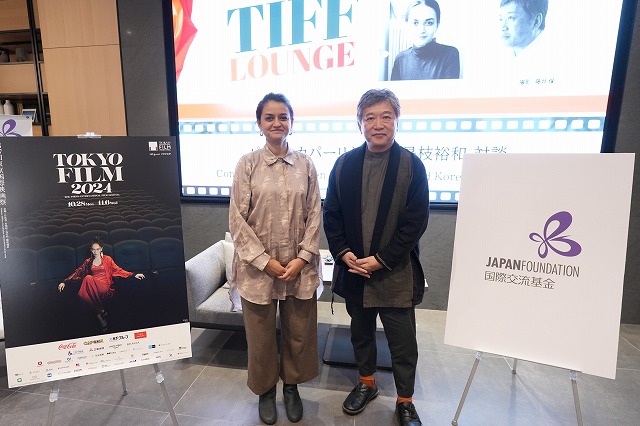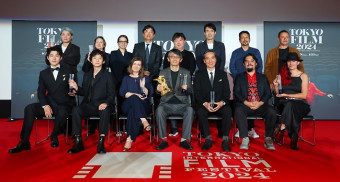
When Japanese director Hirokazu Kore-eda was a member of the jury at this year’s Cannes Film Festival, the movie in the Competition lineup that impressed him the most was Payal Kapadia’s All We Imagine as Light, which went on to win the Grand Prix. “I signed a contract saying I wouldn’t divulge who voted for what and the overall selection process,” he said during his TIFF Lounge conversation with Kapadia on October 29 at the 37th Tokyo International Film Festival. “But when I was asked which director I most wanted to have at the TIFF Lounge, she was the first person who came to mind.”
Kapadia, one of India’s most celebrated independent directors right now, recalled traveling to Cannes with a large group. “My student film, a documentary, was shown at Cannes in the Directors Fortnight section,” she said. “But this year was the first time I saw Cannes in all its glory. We didn’t expect All We Imagine as Light to be selected for the Competition, and as I had worked on it for many years, all this fuss was something new to me. I was very nervous, but fortunately I had my whole retinue with me, including my main actors, so it was a nice feeling.”
Kore-eda commented on the solidarity of her crew and noted that she and her cinematographer went to school together. Kapadia explained that she had attended the Film and Television Institute of India, and that her cinematographer was actually ahead of her. “At that school, you had to stick with the people in your own class,” she said with a laugh. “So it was only through work that we mingled. We filmed [All We Imagine as Light] for two years together, and it was a very collaborative experience. The same went for the cast.”
Prompted about the film education system in India, Kapadia attempted to explain its ecology. “Some film schools are run by individual states, but the one I went to is the only national one, and they only accept 10 people a year. And, you know, India has a lot of people.” When Kore-eda asked her what kind of background she had in film studies to get into the school under such circumstances, Kapadia seemed slightly embarrassed.
Her mother was a painter and video artist, she said, so she had a lot of exposure to the arts while growing up. “Some of her friends were documentary filmmakers, so I saw those films from a young age, but I didn’t necessarily want to do that. It wasn’t until I went to university and attended film festivals that I really got into it.”
Surprisingly, what hooked her were student experimental films that didn’t rely on narratives. “They were very free, and I thought that was interesting, so I applied to film school but was rejected.” She then worked for five years as an assistant director (“which was miserable”), and did a stint in advertising before applying again and getting in. Interestingly, the national film school in India was modeled on a Soviet counterpart, so she was exposed to a lot of Soviet-era films as well as Czech New Wave.
This intrigued Kore-eda, because, by his own admission, he held certain prejudices about Indian filmmaking and wondered how graduates went from such a free and experimental atmosphere into something as formulaic as Bollywood, which is still the dominant film style in India. “It’s difficult to sustain a career with independent movies in India,” said Kapadia, “so most people have to go into mainstream films. There’s no support system for indie films, and people have to earn money, so they start working in Bollywood,” which she was quick to point out is not monolithic. India is a jigsaw puzzle of languages, religions, and regional manners, she noted, but Indians share a fondness for the kind of big-budget spectacle that Bollywood represents.
Kore-eda then moved the conversation toward All We Imagine as Light, Kapadia’s first feature-length narrative film after mainly making documentaries — like her 2023 Yamagata International Documentary Film Festival Grand Prize winner What We Don’t Know About the Night. Her Cannes winner, which will be released in Japan next April, centers on three women who work at a hospital in Mumbai, and endeavors to portray the diversity of the city as well as the unique problems that women face in Indian society through the characters’ individual domestic situations.
Kapadia described the film as one about “friendship and finding your own kind of family,” since these women’s actual families, headed by men, had failed them insofar as emotional support. “In India your real family can sometimes let you down,” she commented. “This new kind of family (depicted in the film) can give more realistic support.”
Kore-eda praised the film’s outlook and presentation, which he described as being “very calm” even though the situations are quite serious. “You showed sympathy for every character, which made it stand out for me among the Competition films at Cannes.” He also appreciated how Kapadia used the human voice, which he found unique.
“The meaning of sound for me is how it affects me physically,” she said. “In Indian cinema we don’t have to be so loud, just talk at normal conversational levels. I prefer the feeling of someone talking into your ear while sitting next to you. You can have a long shot of someone and still have an intimate connection to them through the use of sound — it makes you feel closer to the characters.”
She elaborated on her focus on small everyday objects in her films to give them more depth of feeling, and mentioned the Japanese novelist Kawabata Yasunari, Japan’s first Nobel Prize winner for literature, and his very short stories about simple things. “They were like one page each, just about everyday objects and matters that covered history, dreams, anxieties, all in a few paragraphs. It was very liberating, how you can talk about things with only a few words — deceptively simple but lots of layers.”
The questions from the TIFF Lounge audience mostly centered on Kapadia’s status as an independent woman filmmaker in India and how All We Imagine as Light is likely to alter that status. The film still hasn’t been released widely in India yet — she had to rush back the next day to work on promoting a late November general opening — so she’s not sure what the reaction will be. “We’ve had a few screenings for select people in India and the response has been good, but those are cinephiles,” she said. “Now we have to contend with the general public, but the point is we have to raise these kinds of questions, and how they land with the public is the difficult thing.”
One of the attendant difficulties, and one that foreign audiences do not have to contend with because of subtitles, is that the movie contains multiple languages, which Kapadia insisted on including to emphasize Mumbai’s rich diversity. “It’s actually part of our culture to not understand one another’s language,” she pointed out, “and that’s a central thing for understanding Mumbai.” This reality also highlights how Mumbai is filled with migrants, another theme of the film, which extends to displacement and the need to find a home. “When you move to a city where you don’t speak the language, there’s a distance with other people, but it also means when you share a language with somebody else in such a crowded place, you achieve a precious intimacy. That’s what’s great about cities.”
One audience member said that it was interesting that Kore-eda and Kapadia were in the same room discussing films since both were noted for their strong female characters. The Japanese director seemed taken aback by this observation, demurring that however good his intentions are he is still biologically a man and thus would probably be suspect in his portrayal of women. “I’m always having to update my outlook and I’m always careful,” he insisted. “How does a man portray women? I am aware there is a line and that thinking I can cross that line is kind of arrogant. I just try to work honestly.”
Kapadia expanded on this notion by taking a different tack. “In India we have many identities attached to gender, attached to regions, attached to languages, even attached to the access to resources and capital,” she said. “There are many inequalities, [but] I have to recognize my privilege compared to other women. It’s these multiple identities we have to understand, since they can be dividing factors among people. That’s why I concentrate on love in my movies, because it’s the most basic form of control you can have over your own life: Who is it that I want to spend my life with? In India that problem can be very specific since others, like your family, will try to take that control away from you, and we have to think about it all the time.”
TIFF Lounge Co-presented by The Japan Foundation & Tokyo International Film Festival
Conversation between Payal Kapadia and Kore-eda Hirokazu
Guest Speakers: Payal Kapadia (Filmmaker), Kore-eda Hirokazu (Filmmaker)
Moderator: Ichiyama Shozo (Programming Director, Tokyo International Film Festival)


























































